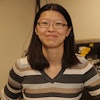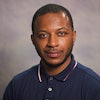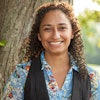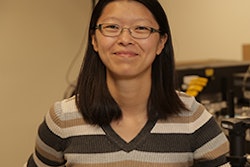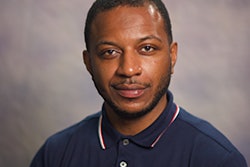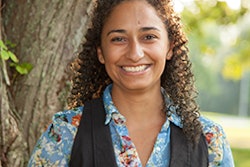When Dr. Kabria Baumgartner went to the University of Massachusetts Amherst to earn her Ph.D., she thought she was going to study 20th century African diasporic literature.
Then she took a seminar on early African American history, and she found herself fascinated by a different time period altogether. It led her to the research she does today on free African Americans in the 18th and 19th centuries.
“I just wanted to know a little bit more about what life was like for them,” she says. “I also just wanted to know what those communities look like. I wanted to think about their activism.”
She found that the North wasn’t the “beacon of racial equality” she expected, which only pushed her to delve deeper.
“It’s part of the learning process,” she says. “You come to it sometimes with assumptions, and you realize ‘Wait, those assumptions are wrong. I need to study more and learn more.’ And then it sort of enlightens you. To me, that’s fun.”
That attitude undergirds her work as an assistant professor of American studies at the University of New Hampshire, where she focuses on gender, race and education in the American antebellum Northeast.
In her first book — In Pursuit of Knowledge: Black Women and Educational Activism in Antebellum America — she studied some of the earliest school desegregation cases. She saw that her assumptions about who these women became and what forces shaped them weren’t always what she thought they would be.
For example, she recently wrote an article on Sarah C. Roberts, a child who had a desegregation lawsuit filed on her behalf in 1850. Baumgartner investigated her life, hoping to see “this activism at an early age propel her down an educational path,” but Roberts seemingly stayed away from public activism as she grew up.
In that story and others, Baumgartner found limits to education.
“It doesn’t mean we shouldn’t fight for it and pursue it, but it can’t solve all of our social problems. It didn’t solve them in the 19th century, it didn’t solve them in the 20th century and it can’t do it now. there are other things we have to do.”
Her work also explores some of the challenges of researching the early lives of African American women and children through archives. Her book took about ten years, in part because there’s “no folder you can go to, no collection oftentimes” that’s simply labeled ‘African American education,’ she says. Sometimes she feels like a “detective,” hunting down sources from different archives, but for her, “there’s fun in that too.”
In general, when Baumgartner hits obstacles in academia — like hard-to-find sources, a difficult class or a paper to revise and resubmit — she likes to remind herself of “the privilege” of being a university professor. “I’m very grateful to be able to teach the courses that interest me, to bring students along to share that interest with them and to be able to pursue the research that I find fascinating and to be able to share that research with a broader audience,” she says. “That is truly a privilege.”
This upbeat approach fits in with how others view her as a scholar. Dr. Wayne Jones Jr., the provost at the University of New Hampshire, described her as having a positive energy about her that encourages her colleagues to collaborate with her.
Jones sees Baumgartner as someone crossing the boundaries between history, women’s studies and African American studies. He also praised her work as a faculty representative on an interdisciplinary think tank to create the Postdoctoral Diversity and Innovation Scholars program, which seeks to increase minority representation among tenured faculty at the University of New Hampshire.
“She’s kind of a nexus unto herself,” he says. “She brings lots of different people together, lots of different disciplines together, and I think makes the conversation on campus more effective.”
Title: Assistant Professor, American Studies, University of New Hampshire
Education: Bachelor’s degree, English, University of California Los Angeles; Master’s degree, African American Studies, University of California Los Angeles; PhD., African-American/Black Studies, University of Massachusetts - Amherst
Age: 36
Career mentors: Dr. Manisha Sinha, University of Connecticut; Dr. Erica Armstrong Dunbar, Rutgers University; Dr. Linda Perkins, Claremont Graduate University
Words of wisdom/advice for new faculty members:: “Just think about self-care and what that looks like in your early career. Knowing that you are going to have to find support, find a team, lean on mentors that you’ve had who brought you along the way and find new ones. I think that’s the most important part.”

